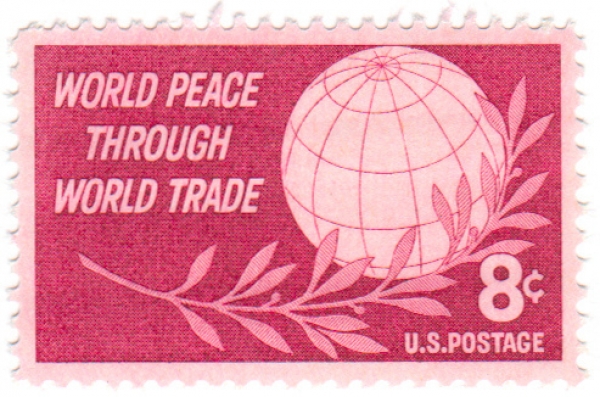Welcome to Around the World! This week we focus on the return of manufacturing jobs to the U.S., a continuing conversation over NSA surveillance, and more.
 | Diplomacy in a Digitally Infused World The pace at which communication tools, techniques, platforms and strategies are changing can be dizzyingly fast. But individual citizens around the world have realized they could create their own movements utilizing this new technology, and have changed the world through it. Read more about it here. |
 | A Manufacturing Resurgence in the U.S.? With John Moavenzadeh of the World Economic Forum Has there been a manufacturing resurgence in the U.S.? What does it mean for blue collar jobs in the nation? John Moavenzadeh, Head of Mobility Industries at the World Economic Forum USA, discusses with the Diplomatic Courier. Watch the interview here. |
 | Edward Snowden and NSA Surveillance: Risks vs. Rewards It is difficult enough to search through limited amounts of information looking for actionable leads and key linkages between suspects or events. When you get to the level of metadata, it is vastly more complicated. And the risks, as Edward Snowden has made clear, are far greater, according to a former covert field operations officer for the CIA. Read more about it here. |
 | What's Hard About It? A Trip Across America by Train Have you ever wondered what it would be like to walk in someone else's shoes, to discover what is difficult about an aspect of their life? Video Correspondent Monica Gray is on a trip across the United States to discover just that. Read more about her trip with the Millennial Trains Project here. |
 | Challenging Assumptions About Regional Transitions The first series of open public opinion polling in the North African region reveals that "the elections in Egypt and the high proportion of the Islamist vote are more complex than one would think, and have less to do with religion.” Read more about it here. |
 | WTO Trade and Global Governance in the 21st Century Born in the 20th century, the World Trade Organization (WTO) is still largely built on rules from then. However, world trade is a rather different beast in the 21st century. The WTO must adapt to this new world or it will be quickly marginalized. Read more about it here. |
 | AUMF: Reasserting the Role of Congress "Look at where we’ve been spending not just our money, but our thought, our creativity over the last 10 to 12 years. It’s all been on the kinetic side... Are all those military resources actually being expended to protect and further the wellbeing of American citizens?" Read more about it here. |
Around the Web
Although there is yet to be an official announcement, citizens of Mali now know who their next president will be. As unofficial results showed his rival with a strong lead in the elections, Soumaila Cisse conceded defeat and wished Ibrahim Boubacar Keita well on Tuesday.
Election season in Germany is getting renewed focus, as German Chancellor Angela Merkel is running into a backlash over allegations her government knew and cooperated with American and British snooping operations revealed by Edward Snowden.
This Week in History
1898: The peace protocol ending the Spanish-American War was signed.
1988: The "8888 Uprising" in Burma was started by students, but quickly spread through a population disaffected with the Soviet-style Socialist government in place. On September 18th, after a bloody military coup by the State Law and Order Restoration Council (SLORC) ended the protests and put in place a repressive military junta, closing off the country for several decades. During the crisis, Aung San Suu Kyi emerged as a national icon, but was placed under house arrest two years later.


a global affairs media network
Around the World!

August 12, 2013
Welcome to Around the World! This week we focus on the return of manufacturing jobs to the U.S., a continuing conversation over NSA surveillance, and more.
 | Diplomacy in a Digitally Infused World The pace at which communication tools, techniques, platforms and strategies are changing can be dizzyingly fast. But individual citizens around the world have realized they could create their own movements utilizing this new technology, and have changed the world through it. Read more about it here. |
 | A Manufacturing Resurgence in the U.S.? With John Moavenzadeh of the World Economic Forum Has there been a manufacturing resurgence in the U.S.? What does it mean for blue collar jobs in the nation? John Moavenzadeh, Head of Mobility Industries at the World Economic Forum USA, discusses with the Diplomatic Courier. Watch the interview here. |
 | Edward Snowden and NSA Surveillance: Risks vs. Rewards It is difficult enough to search through limited amounts of information looking for actionable leads and key linkages between suspects or events. When you get to the level of metadata, it is vastly more complicated. And the risks, as Edward Snowden has made clear, are far greater, according to a former covert field operations officer for the CIA. Read more about it here. |
 | What's Hard About It? A Trip Across America by Train Have you ever wondered what it would be like to walk in someone else's shoes, to discover what is difficult about an aspect of their life? Video Correspondent Monica Gray is on a trip across the United States to discover just that. Read more about her trip with the Millennial Trains Project here. |
 | Challenging Assumptions About Regional Transitions The first series of open public opinion polling in the North African region reveals that "the elections in Egypt and the high proportion of the Islamist vote are more complex than one would think, and have less to do with religion.” Read more about it here. |
 | WTO Trade and Global Governance in the 21st Century Born in the 20th century, the World Trade Organization (WTO) is still largely built on rules from then. However, world trade is a rather different beast in the 21st century. The WTO must adapt to this new world or it will be quickly marginalized. Read more about it here. |
 | AUMF: Reasserting the Role of Congress "Look at where we’ve been spending not just our money, but our thought, our creativity over the last 10 to 12 years. It’s all been on the kinetic side... Are all those military resources actually being expended to protect and further the wellbeing of American citizens?" Read more about it here. |
Around the Web
Although there is yet to be an official announcement, citizens of Mali now know who their next president will be. As unofficial results showed his rival with a strong lead in the elections, Soumaila Cisse conceded defeat and wished Ibrahim Boubacar Keita well on Tuesday.
Election season in Germany is getting renewed focus, as German Chancellor Angela Merkel is running into a backlash over allegations her government knew and cooperated with American and British snooping operations revealed by Edward Snowden.
This Week in History
1898: The peace protocol ending the Spanish-American War was signed.
1988: The "8888 Uprising" in Burma was started by students, but quickly spread through a population disaffected with the Soviet-style Socialist government in place. On September 18th, after a bloody military coup by the State Law and Order Restoration Council (SLORC) ended the protests and put in place a repressive military junta, closing off the country for several decades. During the crisis, Aung San Suu Kyi emerged as a national icon, but was placed under house arrest two years later.


